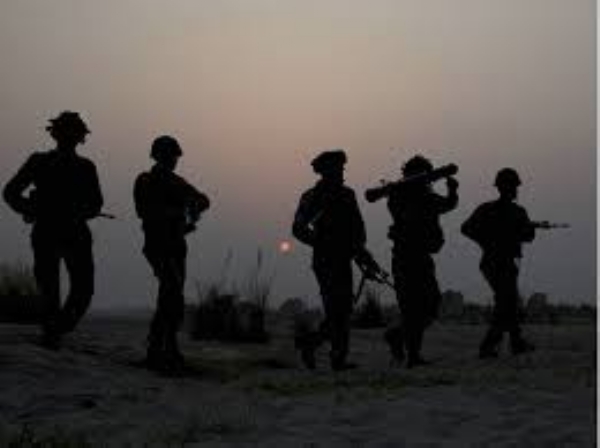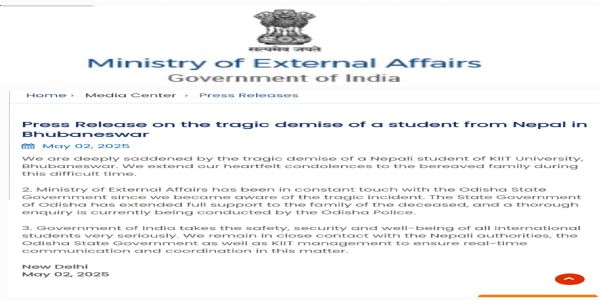
Delhi, 2 May (H.S.): The Pakistan Army is rapidly deploying reinforcements along the Line of Control (LoC) following an escalation in tensions, particularly after attacks on Indian posts with machine-gun fire. This increase in hostilities coincides with India's contemplation of a military response to the April 22 Pahalgam terror incident, which resulted in 26 fatalities. The Pakistani mobilization includes the use of Chinese-origin SH-15 howitzers, introduced three years ago, and the movement of military elements from Khyber Pakhtunkhwa to areas closer to the LoC.
Sources indicate that the actions of the Pakistan Army reflect a level of apprehension towards India's military readiness, with robust preparations reported along the LoC. In a parallel development, India has closed its airspace to Pakistani aircraft shortly after its Cabinet Committee on Security, led by Prime Minister Narendra Modi, analyzed the security landscape in Jammu & Kashmir and related developments.
PM Modi has granted the Indian military the autonomy to respond decisively to the Pahalgam attack, emphasizing that forces can choose the method, targets, and timing of the response. As part of this heightened conflict, the Pakistan Army has fired upon Indian military posts in the Kupwara sector, marking a breach of the ceasefire agreement for the seventh consecutive day, prompting a calculated response from the Indian Army.
The Pakistan Army's operations also extended to the Uri and Akhnoor sectors. Intelligence reports suggest the presence of two active terror launch pads at Leepa and Jura, which face Kupwara—one of the sectors frequently targeted post-Pahalgam attack. There are over 40 identified staging areas for terrorists within Pakistan-occupied Kashmir that they may use to infiltrate into Jammu and Kashmir.
Strategic analyst Lieutenant General BS Jaswal (retd) remarked that Pakistan is aware it has made a significant miscalculation and fears retribution from India. He interpreted the current buildup along the LoC as a defensive measure that might also carry preemptive implications. The situation remains fraught with tension as both sides navigate the precarious dynamics of military engagement in the region.
On Tuesday, the Pakistan military received a warning concerning unprovoked firings along the Line of Control (LoC) during a hotline conversation between an Indian Army brigadier and his Pakistani counterpart. These discussions at the directorate general of military operations (DGMO) level occur every Tuesday. The warning comes in the wake of recent ceasefire violations, which followed an overnight exchange of fire between the two nations along the international border (IB) and the LoC.
On Wednesday, the Pakistan Army resumed firing across the IB—its first such action since April 22—escalating tensions. Pakistani forces targeted Indian positions near the IB in the Pargwal sector of Jammu and opened fire along the LoC in various sectors, including Akhnoor, Naushera, Sunderbani, Baramulla, and Kupwara, aiming to widen their engagement with the Indian Army. Between January and early April 2025, Pakistani troops reportedly violated the February 2021 ceasefire agreement approximately 15 times. However, the recent attacks, which occurred on both the LoC and the IB, initiated the most extensive cross-border exchanges seen since the 2021 ceasefire was established.
Unlike previous isolated and quickly resolved exchanges, the current situation involves simultaneous attacks at multiple locations, escalating in frequency particularly after the Pahalgam terror attack. In response to this incident, India has enacted several punitive diplomatic actions, such as suspending the 1960 Indus Waters Treaty, downgrading bilateral relations, expelling a majority of Pakistani citizens in India, and closing the only operational land border crossing at Attari.
In retaliation, Pakistan has implemented its own measures in response to India’s actions. This includes closing its airspace to Indian airlines, halting all trade with India, and threatening to suspend bilateral agreements like the Simla Agreement. Despite these tensions and retaliatory measures, both nations have thus far not indicated a desire to abandon the ceasefire entirely. The situation remains tense, with both sides continuing to fire at each other along the borders, heightening the risk of further escalations in violence and conflict.
---------------
Hindusthan Samachar / Jun Sarkar








